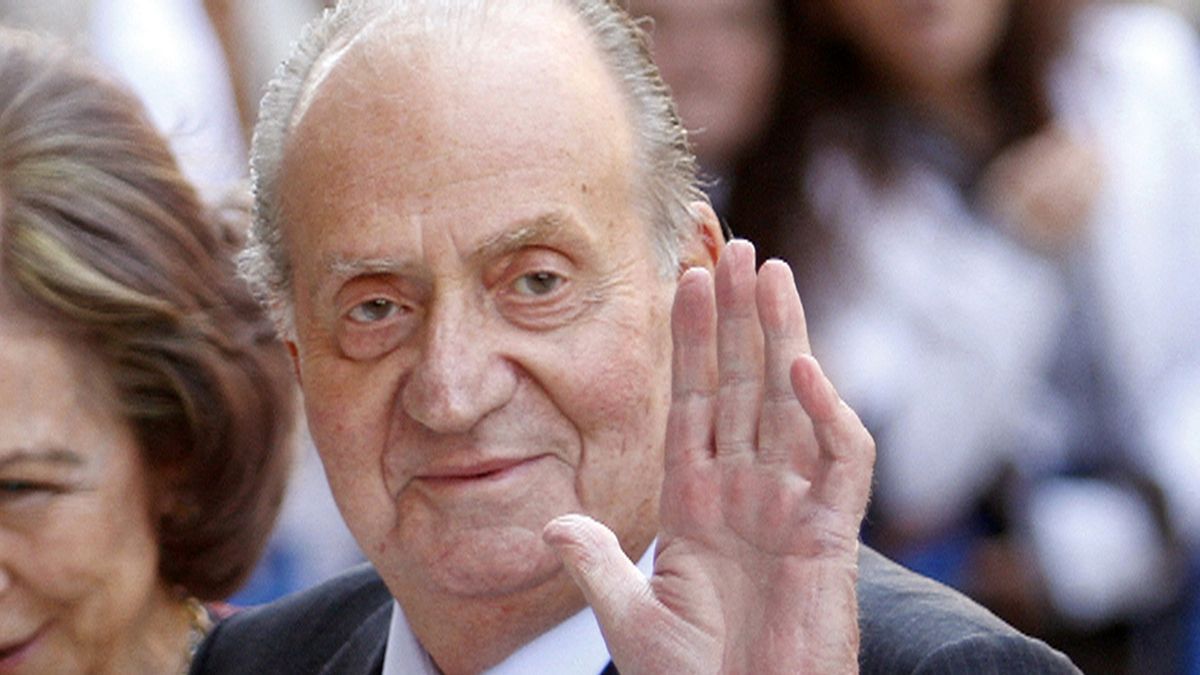His announcement confirming it came today, but King Juan Carlos took the decision in January that he would abdicate. He has carried the Spanish crown since 1975. Frail from his latest surgical operation, the king addressed his subjects the day after his 76th birthday, in a bid to coax back public goodwill for a monarchy whose popularity has plummeted.
Spaniards’ affection for him was sorely stretched when Juan Carlos required hospital care following a fall in Botswana where he’d gone to hunt elephant — an expensive sport — in 2012. He apologised to those buffeted by Spain’s economic crisis.
Juan Carlos said: “I can’t wait to get back to my duties. I am sorry. I acted in error and I won’t let it happen again.”
Health trouble fed rumours he was considering stepping down.
At the same time, the royal family’s credibility was suffering.
The younger princess, Cristina, second of Juan Carlos’s two daughters, was called in for questioning over the fraud and money laundering investigation involving her husband Iñaki Urdangarín, suspected of corruption.
Further tremors issued from the Catalan independence movement. The monarchy is supposed to guarantee the unity of Spain. The people of Catalonia flung that notion of unity to the wind.
The president of the regional government, Artur Mas, has called a referendum on self-determination for this November 9, although this act flies in the face of the Spanish constitution of 1978, the one Juan Carlos helped to deliver for a Spain in transition.
To all appearances, the European elections that have just passed may have crystallised the king’s plans. Spain’s main parties, the centre-right and the centre-left came out of them massively weakened.
The governing conservatives saw their crushing majority go up in smoke, and the main opposition Socialists lost their bet that they would offer a convincing alternative.
Both parties were told of the king’s decision one month ago.
The transfer this month of the crown of Spain to the head of Felipe VI is not expected to be easy.
Paco Fuentes, euronews: “To look more deeply into the King of Spain’s decision we are joined by analyst Antoni Gutiérrez-Rubi, who is in Barcelona. Antoni, is the king’s announcement a surprise or has it been in preparation for a while?”
Antoni Gutiérrez-Rubi, analyst: “It’s more or less a surprise. We think it has been some time in preparation because the monarchy and the king especially were aware that they weren’t managing to fill their popularity quotas in terms of reputation and credibility, as far as the institution requires of the head of state. I think the king has been thinking about this possibility for a long time. He might have wanted to wait for when the physical conditions and, if I may say, the aesthetic conditions were appropriately dignified for his career and his historical standing.”
euronews: “Why do this now, in this political context, just after the European elections, which seem to mark the end of the centrally two-party system in Spain?”
Gutiérrez-Rubi: “I think it was a last-ditch chance to revive the institution, because, let’s remember this is about the head of state. The monarchy urgently needed revitalising. Now we’ll see if the revival will be enough to resolve the problems and challenges Spanish society is facing. What has to happen now, more than ensuring a continuity, a transition, is to re-establish the foundations, since we are in a constitutional process, or in a process of continuity. That is the great challenge that the Prince and the political forces of Spain will be facing.”
euronews: “Prince Felipe will become the head of state, wearing the crown… an institution whose image has deteriorated a lot. What will the main challenges be?”
Gutiérrez-Rubi: “Well, the main thing will be to make all the changes that his father didn’t make, in terms of political, cultural or personal limits. There is the demand that the king set the example through exemplary behaviour, the demand for radical openness, to renounce privileges and for a parliamentarisation of the monarchy. It has to be made to serve parliament more. It’s up to the head of the household, the civil servant to decide how the king should serve the crown. That is to say the head of state must serve parliament and not serve the royal family. It will be very important to make these crucial changes.”
euronews: “Political organisations, especially the nationalists and social movements that are anti-monarchist, are getting more active. Could that have consequences?”
Gutiérrez-Rubi: “I think that Spanish society is demanding a constituent [representational] process. How much? What should it be based on? How far should it go? How and when should this constituent process be developed? That is an open debate. But it would be a mistake for the monarchy, in this case Prince Felipe, who is sure to be the future king, to ignore this very powerful and very firm request on the part of Spanish society to have renewal, to rethink and reconstruct the Spanish constitution and the constituent [representational] process.”
euronews: “Is the survival of the monarchy at risk?”
Gutiérrez-Rubi: “If the prince livens up, stimulates and promotes the monarchy, in spite of it and himself, if he brings about certain crucial changes in Spanish society, in the constituent process, I believe it would be very positive and a great opportunity rather than a risk — for him and for Spain.”
